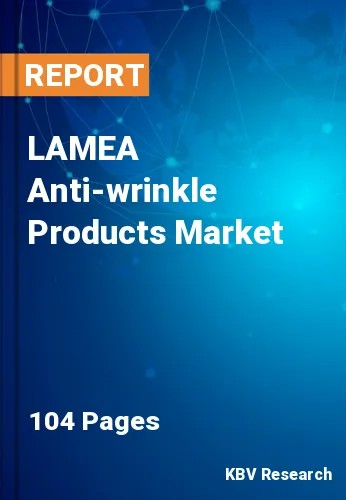The Latin America, Middle East and Africa Anti-wrinkle Products Market would witness market growth of 11.9% CAGR during the forecast period (2022-2028).
The ageing process causes phenotypic changes in cutaneous cells and structural and functional alterations in collagen and elastin extracellular matrix components. In recent years, numerous anti-ageing procedures have been created because skin health & beauty are regarded as one of the most significant indications of human well-being. In addition, increased consumer awareness of skin concerns associated with ageing, including wrinkles, dullness, and fine lines, and their increasing readiness to spend on beauty products to declare their skin's youthfulness is projected to fuel market demand over the projection period.
Incorporating modern technologies has given the anti-ageing cosmetics sector a new dimension. For example, Hyaluronic Acid (HA)-based formulations in creams, gels, lotion, serums, and others are a novel contribution to the anti-wrinkle products market. In addition, soft tissue augmentation, increased skin hydration, elastin and collagen stimulation, and face volume regeneration were utilized to accomplish this.
The Middle East is known for spending money on cosmetics. Grooming and care are highly valued in this society. Arab women's perceptions of their beauty rituals are changing because the region has some of the world's highest per capita beauty spending rates. The main factors influencing the trend are the growing popularity of skincare among young people, their strong purchasing power, and the expansion of distribution channels. Internet users have become the most important consumers in the area. Influencers on social media who share their beauty routines and tools have been more well-liked in recent years. Local and international beauty companies work with influencers to engage potential clients and raise brand recognition. Hence, in the LAMEA region, these factors fuel the expansion of the anti-wrinkle products market.
The Brazil market dominated the LAMEA Anti-wrinkle Products Market by Country in 2021, and would continue to be a dominant market till 2028; thereby, achieving a market value of $309.5 million by 2028. The Argentina market is exhibiting a CAGR of 12.5% during (2022 - 2028). Additionally, The UAE market would display a CAGR of 11.6% during (2022 - 2028).
Based on Type, the market is segmented into Creams, Lotion, Oil, Serum, Gel, and Others. Based on Active Ingredients, the market is segmented into Vitamin C, Retinoids, Hydroxy Acids, Citric Acid, Glycolic Acid, Lactic Acid, Peptides & Coenzyme Q10, Tea Extracts, Niacinamide & Grape Seed Extracts, and Others. Based on Distribution Channel, the market is segmented into Supermarkets & Hypermarkets, Specialty Stores, Pharmacies & Drugstores, and Online. Based on countries, the market is segmented into Brazil, Argentina, UAE, Saudi Arabia, South Africa, Nigeria, and Rest of LAMEA.
Free Valuable Insights: The Worldwide Anti-wrinkle Products Market is Projected to reach USD 16 Billion by 2028, at a CAGR of 8.6%
The market research report covers the analysis of key stake holders of the market. Key companies profiled in the report include L'Oreal Group, Shiseido Company Limited, The Procter and Gamble Company (Olay), Unilever PLC (Ren Clean Skincare), The Estée Lauder Companies, Inc., Johnson & Johnson (Neutrogena), Galderma S.A., Life Extension Foundation Buyers Club, Inc., RoC Opco LLC (Gryphon Investors) and Clarins Group SA.
By Type
By Active Ingredients
By Distribution Channel
By Country
Our team of dedicated experts can provide you with attractive expansion opportunities for your business.

